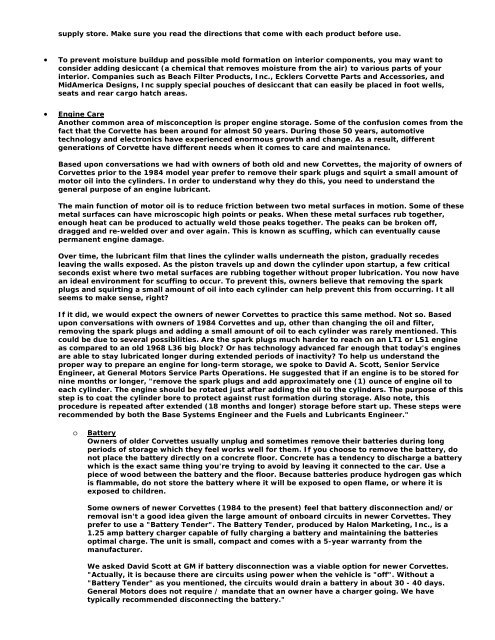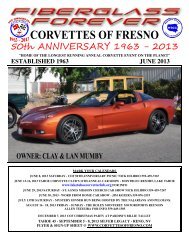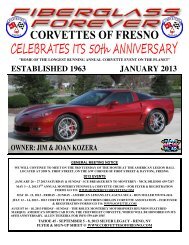corvettes of fresno - Description: Description: Description ...
corvettes of fresno - Description: Description: Description ...
corvettes of fresno - Description: Description: Description ...
Create successful ePaper yourself
Turn your PDF publications into a flip-book with our unique Google optimized e-Paper software.
supply store. Make sure you read the directions that come with each product before use.<br />
• To prevent moisture buildup and possible mold formation on interior components, you may want to<br />
consider adding desiccant (a chemical that removes moisture from the air) to various parts <strong>of</strong> your<br />
interior. Companies such as Beach Filter Products, Inc., Ecklers Corvette Parts and Accessories, and<br />
MidAmerica Designs, Inc supply special pouches <strong>of</strong> desiccant that can easily be placed in foot wells,<br />
seats and rear cargo hatch areas.<br />
• Engine Care<br />
Another common area <strong>of</strong> misconception is proper engine storage. Some <strong>of</strong> the confusion comes from the<br />
fact that the Corvette has been around for almost 50 years. During those 50 years, automotive<br />
technology and electronics have experienced enormous growth and change. As a result, different<br />
generations <strong>of</strong> Corvette have different needs when it comes to care and maintenance.<br />
Based upon conversations we had with owners <strong>of</strong> both old and new Corvettes, the majority <strong>of</strong> owners <strong>of</strong><br />
Corvettes prior to the 1984 model year prefer to remove their spark plugs and squirt a small amount <strong>of</strong><br />
motor oil into the cylinders. In order to understand why they do this, you need to understand the<br />
general purpose <strong>of</strong> an engine lubricant.<br />
The main function <strong>of</strong> motor oil is to reduce friction between two metal surfaces in motion. Some <strong>of</strong> these<br />
metal surfaces can have microscopic high points or peaks. When these metal surfaces rub together,<br />
enough heat can be produced to actually weld those peaks together. The peaks can be broken <strong>of</strong>f,<br />
dragged and re-welded over and over again. This is known as scuffing, which can eventually cause<br />
permanent engine damage.<br />
Over time, the lubricant film that lines the cylinder walls underneath the piston, gradually recedes<br />
leaving the walls exposed. As the piston travels up and down the cylinder upon startup, a few critical<br />
seconds exist where two metal surfaces are rubbing together without proper lubrication. You now have<br />
an ideal environment for scuffing to occur. To prevent this, owners believe that removing the spark<br />
plugs and squirting a small amount <strong>of</strong> oil into each cylinder can help prevent this from occurring. It all<br />
seems to make sense, right?<br />
If it did, we would expect the owners <strong>of</strong> newer Corvettes to practice this same method. Not so. Based<br />
upon conversations with owners <strong>of</strong> 1984 Corvettes and up, other than changing the oil and filter,<br />
removing the spark plugs and adding a small amount <strong>of</strong> oil to each cylinder was rarely mentioned. This<br />
could be due to several possibilities. Are the spark plugs much harder to reach on an LT1 or LS1 engine<br />
as compared to an old 1968 L36 big block? Or has technology advanced far enough that today's engines<br />
are able to stay lubricated longer during extended periods <strong>of</strong> inactivity? To help us understand the<br />
proper way to prepare an engine for long-term storage, we spoke to David A. Scott, Senior Service<br />
Engineer, at General Motors Service Parts Operations. He suggested that if an engine is to be stored for<br />
nine months or longer, "remove the spark plugs and add approximately one (1) ounce <strong>of</strong> engine oil to<br />
each cylinder. The engine should be rotated just after adding the oil to the cylinders. The purpose <strong>of</strong> this<br />
step is to coat the cylinder bore to protect against rust formation during storage. Also note, this<br />
procedure is repeated after extended (18 months and longer) storage before start up. These steps were<br />
recommended by both the Base Systems Engineer and the Fuels and Lubricants Engineer."<br />
o Battery<br />
Owners <strong>of</strong> older Corvettes usually unplug and sometimes remove their batteries during long<br />
periods <strong>of</strong> storage which they feel works well for them. If you choose to remove the battery, do<br />
not place the battery directly on a concrete floor. Concrete has a tendency to discharge a battery<br />
which is the exact same thing you're trying to avoid by leaving it connected to the car. Use a<br />
piece <strong>of</strong> wood between the battery and the floor. Because batteries produce hydrogen gas which<br />
is flammable, do not store the battery where it will be exposed to open flame, or where it is<br />
exposed to children.<br />
Some owners <strong>of</strong> newer Corvettes (1984 to the present) feel that battery disconnection and/or<br />
removal isn't a good idea given the large amount <strong>of</strong> onboard circuits in newer Corvettes. They<br />
prefer to use a "Battery Tender". The Battery Tender, produced by Halon Marketing, Inc., is a<br />
1.25 amp battery charger capable <strong>of</strong> fully charging a battery and maintaining the batteries<br />
optimal charge. The unit is small, compact and comes with a 5-year warranty from the<br />
manufacturer.<br />
We asked David Scott at GM if battery disconnection was a viable option for newer Corvettes.<br />
"Actually, it is because there are circuits using power when the vehicle is "<strong>of</strong>f". Without a<br />
"Battery Tender" as you mentioned, the circuits would drain a battery in about 30 - 40 days.<br />
General Motors does not require / mandate that an owner have a charger going. We have<br />
typically recommended disconnecting the battery."
















